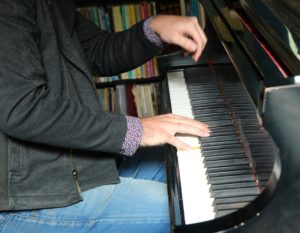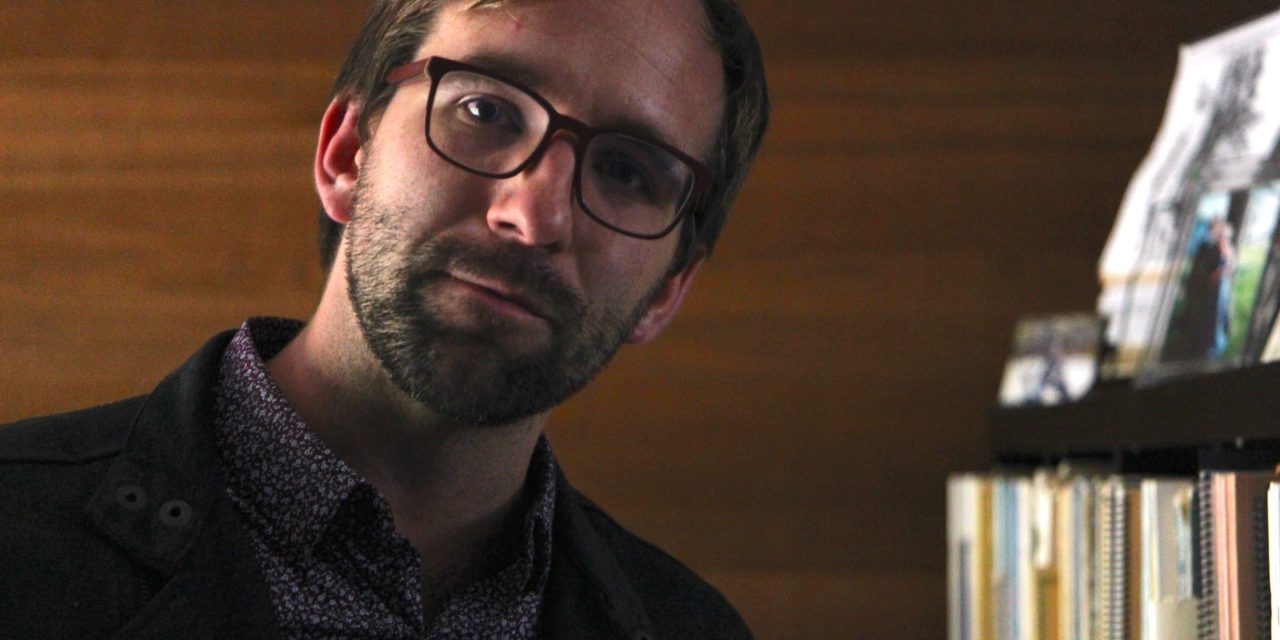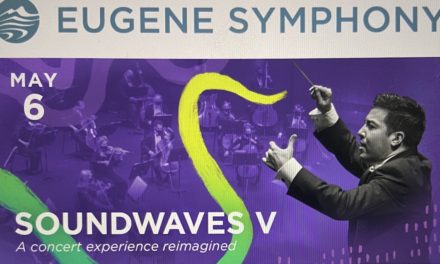(Above: Pianist and piano teacher Matthew Pavilanis’ philosophy of teaching is to “have students build a relationship with music that is natural to them and enjoyable to them.” Photos by Randi Bjornstad)
By Randi Bjornstad
A few days ago, an enthusiastic parent posted a message on the nextdoor.com site for her Eugene neighborhood, under the heading, “Best Piano Teacher I’ve Ever Seen.”
(For those who haven’t discovered nextdoor.com yet, you might give it a try. People buy and sell things, get recomendations for craftspeople, spread the word about lost pets, make connections for child or pet care, ask for help or offer help, and much more — including finding music teachers — all within the neighborhood or part of the city in that is convenient to them.)
In the case of the happy mother-of-the-piano-student, the subject of her rave is Matthew Pavilanis, a 32-year-old musician who lives in a house with two piano studios, two small dogs (Ollie and Lyric), and a bustle of students large enough that he now needs assistants to accommodate them all.
“I just got to the point that I happily realized I was making a living — that I am able to make music my vocation at a relatively young age,” Pavilanis said. “I get to do music all day long — it’s kind of an amazing thing.”
His student roster totals about 60, which is why he needs teaching assistants, and his eventual dream “is to open a charter school for older students in all kinds of creative arts,” Pavilanis said.

When Matthew Pavilanis discovered classical piano music, “I fell head over heels in love” he said
He also still gives the occasional concert. He will perform at 3:30 p.m. on Sept. 16 in Junction City at the United Methodist Church.
While many music professionals find their instruments in early childhood, Pavilanis got a relatively late start at piano, when he was 16 years old.
“I grew up in southwest Michigan, and I got a guitar for my 10th birthday,” he recalled. “My older brother was in a band, and I was very interested in that, and I learned all styles of guitar playing first.”
In fact, Pavilanis left high school early, finishing his diploma via correspondence classes while he went to Los Angeles to participate with his brother’s band. He completed a master’s degree in music at the University of Oregon in 2011.
“I actually had started teaching other people guitar since I was 14, so I guess teaching is just a very natural way for me to express myself,” he said. “But before long, I felt that guitar wasn’t the right fit for me — I had started taking piano lessons because I wanted to start writing music for the band, and when I got into classical music for piano, I fell head over heels in love with it.”
That doesn’t mean that’s the only kind of piano he teaches.
“I think all music is great and created equal,” Pavilanis said. “My way is not necessarily for everyone — it’s important to be emotionally attached to the music you love, to play it out of choice, not obligation — and so I teach all types of music.”
That approach became obvious to the young teacher very early in his career, “when I observed students that just weren’t happy with conventional lessons — some of them would end up crying at each lesson, being so self-critical and just not enveloping themselves in what they were doing,” he said.
His response was to change the style, sometimes to have the student sing and play some popular song, “and often the whole process would change for them,” Pavilanis said. “My whole philosophy became to have students build a relationship with music that is natural to them and enjoyable to them.
“Music should be a wonderful, not a miserable, experience.”
In addition to individual lessons, Pavilanis’ students — and teachers — occasionally meet for joint jam sessions, partly because piano playing can be such a solitary exercise.
“I realized when I was part of a band that music in that form is a very social experience,” he said. “But I also realized when I started playing piano that because it is mainly a solo instrument, it can become very solitary, not social.”
His students range in age from 5 years to 75 years, “and they also sometimes perform in recitals, which is a really great experience to bring them together and learn from each other,” Pavilanis said.
Most of the time, it’s the older people who are more reluctant to perform in public.
“Sometimes I think it’s because they had lessons when they were young and had bad experiences, and they’ve never never worked through that,” he said. “Or maybe it’s because they’re more afraid of making a mistake in public.”
That’s why it’s good for them to see children perform and to absorb some of their youthful fearlessnes, he said.
“Young children don’t seem to mind making mistakes — they just do it and go on, where the adults are more likely to think they have to stop and analyze and fix something.”
Above all, incorporating music into everyday life, whether listening or playing, is of paramount importance, in Pavilanis’ point of view.
“My mom was a nurse, but she also played piano and greatly encouraged music at home,” he said. “She also knew you had to commit to it — she said if we wanted lessons we had to agree to do it for a year. She always bought me CDs, and she never said ‘no’ if I asked for some sheet music.”
A normal Christmas gift under his childhood tree “was a stack of guitar books,” Pavilanis said.
Upcoming performance:
When: 3:30 p.m. on Sunday, Sept. 16
Where: United Methodist Church, 750 W. 10th St., Junction City
Program: Piano works by early 20th-century French composers, including Francis Poulenc, Maurice Ravel, Erik Satie, and Claude Debussy; plus Franz Liszt’s Reminiscences of Don Juan and the Sonata in A Major by Franz Schubert
Admission: Free, but donations are appreciated
Contact Matthew Pavilanis
Email: matthewpavilanis@gmail.com
Telephone: 269-267-3664

Musician and piano teacher Matthew Pavilanis practices a piece by Francis Poulenc that he will perform in Junction City on Sept. 16












